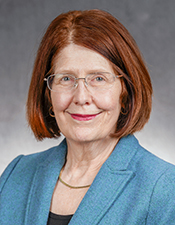Licensing bill would usher in seven health professional interstate compacts to ease worker shortages
The conference committee report to the health occupational licensure and scoping bill was adopted Saturday evening in short order.
Rep. Tina Liebling (DFL-Rochester) and Sen. Melissa Wiklund (DFL-Bloomington), sponsor HF4247 that now heads back to the House and Senate for a final vote.
To help address worker shortages, seven interstate compacts would be created to allow certain licensed professionals in other charter participating states to practice in Minnesota: physician assistants, occupational therapists, physical therapists, professional counselors, audiology and speech-language pathologists, dental hygienists, and social workers.
Registered transfer care specialists would be allowed to remove dead human bodies from a place of death, under the supervision of a licensed mortician. This measure aims to help address shortages of morticians, particularly in rural areas, who may be unavailable to respond to the scene of a crime, home, or health care facility when a person dies to remove a dead body.
Other professions with provisions in the agreement are veterinary specialists, dental assistants, social workers, marriage and family therapists, and optometrists. The bill would delineate details of licensure for these professions, such as qualifications, supervision and evaluation, disciplinary actions for violations of law, and authorized activities under their scopes of practice. The interstate compacts language would dictate how to handle adverse actions, data systems regulations, rulemaking, oversight, dispute resolution, and enforcement.
The bill would repeal a section of law that requires physician assistants to consult and enter into a practice agreement with a licensed physician when providing ongoing psychiatric treatment for children with emotional disturbance or adults with serious mental illness.
And a behavior analyst advisory council would be created.
The bill would appropriate from special revenue funds $911,000 in fiscal year 2025 and $482,000 in the 2026-27 biennium.
Sen. Paul Utke (R-Park Rapids) questioned why Senate provisions, such as matters related to midwives or international medical graduates, were missing from the agreement.
“As our speaker likes to say, it is kind of the ‘season of disappointment,’ but I think we can be very proud of a lot of the provisions in this bill that are going to be helpful to lots and lots of people and represent a lot of compromise, which we know is completely necessary” Liebling said.
Related Articles
Search Session Daily
Advanced Search OptionsPriority Dailies
Ways and Means Committee OKs House budget resolution
By Mike Cook Total net General Fund expenditures in the 2026-27 biennium will not exceed a hair less than $66.62 billion.
That is the budget resolution approved Tuesday by the House Ways...
Total net General Fund expenditures in the 2026-27 biennium will not exceed a hair less than $66.62 billion.
That is the budget resolution approved Tuesday by the House Ways...
Minnesota's budget outlook worsens in both near, long term
By Rob Hubbard It looks as if those calling for less state spending could get their wish, judging from Thursday’s release of the February 2025 Budget and Economic Forecast.
A state su...
It looks as if those calling for less state spending could get their wish, judging from Thursday’s release of the February 2025 Budget and Economic Forecast.
A state su...
